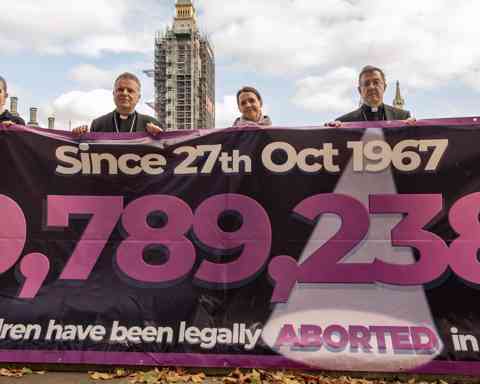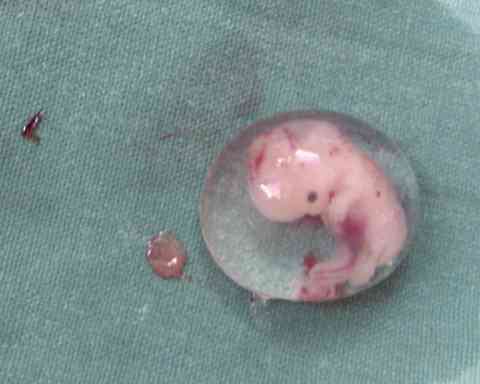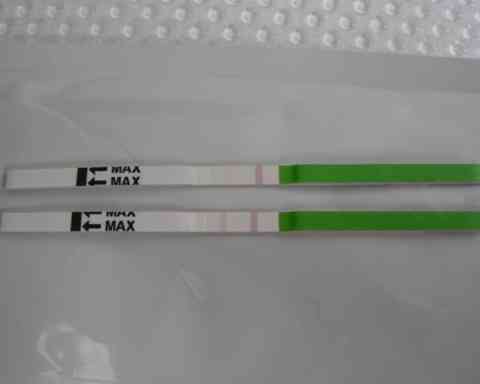Bioethics in Brief: IVF and Artificial Insemination
Bioethics In Brief – IVF And Artificial InseminationInfertility can be a terrible burden for couples to bear. The desire to have a child is one of the most profound human desires, and furthermore the Church teaches that parenthood is an ‘exalted vocation’ (Catechism of the Catholic Church, §2369) and that children are the ‘supreme gift of marriage’ (Catechism, §2378). Hence, the difficulties experienced by those who cannot have biological children of their own can be very real indeed.
The Church considers various medical techniques for addressing infertility as positive developments that are perfectly morally permissible. Where the aim is not to replace the sexual act as the means of conception, but to allow it to reach its natural aim of procreative union, then this could be a morally permissible method of assisting reproduction. Infertility has many possible causes, ranging from a blocked fallopian tube, to endometriosis, to hormonal problems, and many others. Treating these underlying issues with the aim of addressing infertility would not in any way alter or replace the natural sexual act, hence preserving the child’s right to be conceived from an act of love. The approach known as NaProTechnology is one well-known pathway for assisting reproduction in such a morally permissible way. This technology tracks the wife’s fertility cycle, and can identify hormonal problems which may then be addressed. As morally acceptable, the Church points to techniques such as hormonal treatments, or various forms of surgery for conditions such as endometriosis and the unblocking or repair of fallopian tubes (see Dignitas personae, §13).
IVF is different from these techniques in morally relevant ways. To see how we need first to consider the nature of marriage as a one flesh union of spouses, a nature which not only makes sense morally but is also taught by Jesus as the real nature of marriage (Matthew 19:4-6; Mark 10:6-9). In marriage husband and wife actually do become ‘one flesh’ together. Sex between them is a real union, a real marriage, of mind and body: two become one. Marital union is inherently oriented towards procreation, where the child conceived is a fruit of the embodied, loving union between husband and wife. The two goods are harmonious and equally good – one is not merely a means to the other.
IVF separates both goods and does so in a way that fails sufficiently to respect the personal dignity of either. In terms of their marital union, IVF takes reproduction (i.e., conception) between the couple away from and outside their one flesh union. So their personal one flesh union is bypassed and reproduction between them is de-personalised: it takes place clinically in a laboratory, away from the couple, and also in a wider commercial context. The choice to pursue IVF thus depreciates the personal significance of their own one flesh union, the foundation of their marriage. Contemporary culture struggles to see this because it has largely lost sight of the personal significance of marriage as a union founded on two persons becoming one flesh. The common view in today’s world is that sex, even in marriage, is just a means to an end, whether towards pleasure or towards children. In fact, sexual union is the very consummation and embodiment of marriage.
When marital union is bypassed in these ways, it presents not just a problem of principle but also many practical difficulties. Infertility is caused by a variety of different factors, including underlying health problems, but these causes are circumvented with IVF and not treated. Although IVF can lead to pregnancy, it does not boast a high success rate for live births, which, depending on the woman’s age group, could be 25% or lower. With IVF, thus, a high-tech method is held out to couples who may be very desperate, and its lack of success can be difficult to accept. By contrast, when couples attempt to address the underlying causes of infertility, instead, while success is not guaranteed the process often leads to greater acceptance of the limits of one’s body.
Similarly as regards any child conceived via IVF, their conception is not the fruit of a loving one flesh union but is rather the product of clinical technique subject to commercial contract. Although the child will be loved by their parents soon after being conceived, with IVF she is not personally loved into existence as a fruit of the embodied love of her mum and dad. Some might think that the distinction is not significant since the ‘result’ may be the same. Yet ethics concerns intentions, heart, and character more centrally than it concerns ‘results’.
A glimpse into how a choice for IVF involves an immoral intentional stance towards one’s prospective child can be provided by the following consideration, one firmly based on the reality of the process in question. In virtually every IVF procedure the intending parents are willing to reproduce numerous embryonic children and conditionally willing to discard any one of them if that child’s genetic features are not of sufficiently high quality. So no child accepted for implantation is accepted unconditionally. The child is not personally loved into existence, and some of his siblings will have been deliberately discarded from existence. The Church, based on Jesus’ teachings, holds that every child is a gift from and an image of God, and ought never be treated as a possession, or as a commodity, or as something to be made subject to a quality control mentality. While infertility is unquestionably a real struggle for many couples, to think that anyone has the right to a child is to think of children in terms of commodities or adults’ needs, rather than as persons in their own right.
Read the Bioethics in Brief entry on Status of the Embryo.
The situation already outlined with IVF is made worse where donor sperm or eggs, or surrogacy, is used: a third biological parent enters into the couple’s family relationship, which interrupts the unity of marriage, and may also cause identity problems for resulting children in the future. Additionally, children may be burdened by feelings of indebtedness to their parents and others involved. Respecting the dignity of these children as equal to that of their parents can only happen when they are conceived as a result of the loving, sexual act between the genetic parents.
There are problems relating to the exploitation of women when donor eggs or surrogate mothers are used. Financial incentives, whether classed as payment or compensation, can sometimes lead women in vulnerable positions to donate their eggs or to agree to be a surrogate mother, only to have to deal with the pain of never being able to meet the child they carried or the child who carries their genes ever again. What is given away, often under serious financial or personal pressure, is not simply a ‘spare part’ of the body, but a whole identity and relationship.
Although with artificial insemination conception takes place within the woman’s body, and no embryos are discarded, the process of conception is still divorced from sexual union. As with IVF, sperm is obtained via masturbation, and conception does not occur through the spouses’ personal one-flesh union. As with IVF, the child is not received from an act of love but is ‘mechanically’ produced. Hence artificial insemination is similarly inconsistent with the respect and dignity owed to every child and to marital union itself.
Ultimately, the Church’s teaching on the respect owed to every child is inseparable from her teaching on the meaning of sexuality and marriage. Our sexuality is ordered towards the unitive love of the couple and the procreation of human life. These two dimensions of sex are deeply intertwined. Because the one flesh union within marriage unites the married couple in such a profound bodily and spiritual way, it is fitting for the procreation of new persons; and because sex is inherently ordered towards procreation it unites the couple in a way that transcends themselves.
Read the Bioethics in Brief entry on Contraception.
As mentioned above, IVF goes against the respect owed to a child from the first moment of their existence because the child comes, not from an act of unitive love between spouses, but from a mechanical procedure. This applies even when IVF is used in a way that does not result in the destruction of any embryos (e.g., by only fertilising one egg and transferring the resulting embryo to the mother).
It is also important to remember that while no embryo has their life deliberately ended when IVF is used in this way, the technique of IVF has been developed through experiments involving the destruction of countless embryonic human beings. The IVF industry has never stopped experimenting on embryonic human beings in order to improve the efficiency of the technique. Therefore, even to use IVF without discarding human embryos would still mean relying on lethal experimentation on them.
Absolutely not. On the contrary, the Catholic faith deems IVF immoral because it acknowledges the profound dignity of every child as an image of God and therefore as worthy of being personally loved into existence. Whatever the circumstances of their conception, each and every child is created in the image and likeness of God, and is loved infinitely by Him. This is the true identity of every child, and that is why every child, once conceived, must be welcomed and protected.
The Church does not reject or condemn in any way children conceived via IVF, who in any case had no say in the way they were conceived. Like any human being, a child conceived via IVF has a soul created by God for eternity. God creates and infuses a soul when every child is conceived, regardless of the circumstances.
Many children will start thinking about their origins at some point, and some will find the fact of IVF uncomfortable. Particularly difficult may be the thought that, in some cases, an egg or sperm donor was used, or that sibling embryos may have been created in the petri dish, then discarded or frozen, while they were selected to be born. It is important not to belittle any feelings of concern or any desire of the child to know their genetic parent (if donor egg or sperm was used), while at the same time reminding them that they are loved unconditionally by their legal parents and by God.
One cannot go back in time and change the way someone was conceived, but as a parent one can teach one’s child to find self-acceptance in their most fundamental identity – a child of God, created in His image and likeness. One can explain that although the circumstances of their conception were far from ideal, everyone is created personally by God and loved by Him from the first moment of their existence. It is this love that has the power to overcome any human deprivation, including in the way we were conceived.
The Catholic Church has not commented on every single medical technique available, but she offers us a simple moral criterion with which to judge various forms of assisted reproductive technology. If the medical technique helps facilitate the loving act of sex between spouses, or helps it to possibly result in new life, then there might be reason to consider the technique morally acceptable. However, if the technique replaces the loving act of sex between spouses, then it is not acceptable.
Most recent
Bioethics in Brief: The Status of the Human Embryo
16 April 2022
Our ‘Bioethics in Brief’ on the Status of the Human Embryo.
Bioethics in Brief: Contraception and Natural Family Planning
16 April 2022
Our ‘Bioethics in Brief’ on the Contraception and Natural Family Planning.
Sincerest Thanks for Your Support
Staff are grateful to all those who sustained the Centre in the past by their prayers and the generous financial support from trusts, organisations, communities and especially from individual donors, including the core funding that came through the Day for Life fund and so from the generosity of many thousands of parishioners. We would finally like to acknowledge the support the Centre has received from the Catholic community in Ireland, especially during the pandemic when second collections were not possible.
We would like to emphasise that, though the Centre is now closed, these donations have not been wasted but have helped educate and support generations of conscientious healthcare professionals, clerics, and lay people over almost 50 years. This support has also helped prevent repeated attempts to legalise euthanasia or assisted suicide in Britain and Ireland from 1993 till the end of the Centre’s work on 31 July 2025.



